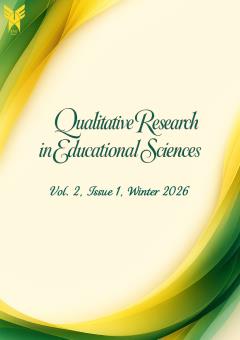Identification of Barriers to Constructive Interaction Between Parents and School Educators and Strategies for Improvement
Subject Areas : Synthesis Research
Mozhgan FereydounNezhad
1
*
![]() ,
Neda Haselou
2
,
Neda Haselou
2
![]()
1 - Department of Psychology and Counseling, Farhangian University, Tehran, Iran
2 - Department of Elementary Education, Sherafat Higher Education Center, Farhangian University of Tehran, Iran
Keywords: Constructive interaction, parents, teachers, school, education,
Abstract :
In the era of participatory education, constructive interaction between parents and educators is a key factor in educational and training success. However, the lack of effective communication between these two institutions disrupts learning and reduces the school’s social capital. The aim of this study is to identify the barriers to parent–teacher interaction and to suggest strategies for improvement. This research employed a qualitative meta-synthesis approach. A systematic search was conducted in domestic and international databases, and relevant articles up to the year 2025 were collected and screened based on inclusion and exclusion criteria. Finally, qualitative data from selected studies were analyzed and synthesized using thematic analysis. The findings revealed six major categories of barriers: cognitive-attitudinal, communicational-interactional, structural-organizational, familial-social, school-professional, and legal-policy. The consequences of this communication gap appeared in psychological and academic aspects of students, school performance, social-cultural relations, and long-term structural effects. Finally, practical strategies at educational, communicational, managerial, familial, and policy levels were suggested.
بازرگان، زهرا. (۱۳۹۹). تحولی در روابط بین اولیاء و مربیان. پیوند، (۶۲۶۶)، ۱-۱۲.
برقی، عیسی و گراییگراوند، پیمان. (۱۳۹۹). تأثیر مشارکت والدین بر کیفیت زندگی تحصیلی و سازگاری دانشآموزان. روانشناسی مدرسه و آموزشگاه، ۹(۴)، ۹۶- ۱۰۵.
تیزفهمفرد، غلامرضا. (۱۴۰۲). بررسی تأثیر همکاری اولیاء با مربیان در حل مشکلات تربیتی و تحصیلی دانشآموزان. در سیزدهمین کنفرانس بینالمللی روانشناسی، علوم تربیتی و سبک زندگی. تفلیس،گرجستان.
حبیبی، سمیرا، علیآبادی، خدیجه، نیلی احمدآبادی، محمدرضا و زارعی زوارکی، اسماعیل. (۱۴۰۱). طراحی و تدوین الگوی پیشنهادی مشارکت والدین و بررسی تأثیر آن بر پیشرفت تحصیلی دانشآموزان. راهبردهای آموزش در علوم پزشکی، ۱۵(۲)، ۱۳۱- ۱۴۰.
حیدری، صدیقه. (۱۴۰۰). تحلیل ساختار نسخه فارسی مقیاس نگرش نسبت به هیجانات در بین دانشآموزان متوسطه دوم شهر ایذه. رهبری آموزشی کاربردی، ۲(۴)، ۴۵–۵۴.
دبیریمنش، فرزاد و صداقتخواه، رامین. (۱۴۰۰). چگونه با استفاده از مدیریت خود میتوانیم نقش انجمن و اولیاء را در امور مدارس ابتدایی افزایش دهیم؟ پیشرفتهای نوین در روانشناسی، علوم تربیتی و آموزش و پرورش، ۴(۳۶)، ۱۶۲- ۱۷۱.
رحیمی، مهدی، شیربند، الهام و اسعدی، سمانه. (۱۳۹۸). بررسی رابطه کیفیت مشارکت والدین در انجام دادن تکالیف درسی با عملکرد تحصیلی در حوزه خواندن دانشآموزان پایه ششم. خانواده و پژوهش، ۱۶(۴)، ۶۵-۸۲.
زارعی، احمد، دهقانی، مرضیه و صالحی، کیوان. (۱۳۹۸). واکاوی محدودیتهای مشارکت والدین در مدارس متوسطه: مطالعهای با رویکرد پدیدارشناسانه. نظریه و عمل در برنامه درسی، ۷(۱۴)، 71-96.
سراجی، فرهاد و شکوری، نگار. (۱۳۹۹). موانع مشارکت والدین در ارزشیابی توصیفی: مطالعه کیفی. مطالعات اندازهگیری و ارزشیابی آموزشی، ۱۰(۲۹)، ۲۲۹-۲۶۰.
عطاران، محمد. (۱۴۰۰). نظریات علمای بزرگ مسلمان در باب تربیت کودک. ویژهنامه تابستان تربیت، ۱۲(۲)، ۵۰–۶۲.
قاسمی، طاهر. (۱۴۰۲). تعامل خانه و مدرسه، چالشها و راهکارهای آن. در چهاردهمین کنفرانس بینالمللی پژوهشهای مدیریت و علوم انسانی در ایران، 286-۳۰۵. تهران.
محمدطاهری، عاطفه. (۱۴۰۱). روشهای ایجاد هماهنگی و تعامل میان والدین و معلمان با هدف کمک به رشد تربیتی و پیشرفت تحصیلی دانشآموزان و راهکارهایی برای آن. در پنجمین همایش بینالمللی روانشناسی، علوم تربیتی و مطالعات اجتماعی. همدان.
منافی، بهراد، ساروخانی، باقر و آقاجانی مرساء، حسین. (۱۴۰۳). طراحی الگوی تعامل اثربخش خانواده و مدرسه با نقش راهبردی انجمن اولیاء و مربیان در راستای بند ۱۱ سیاستهای کلی خانواده (مورد مطالعه: شهر تهران). راهبرد اجتماعی فرهنگی، ۱۳(۳)،1120- ۱۰۷۵.
میرکیزاده، مهناز، نصرتی، مریم و محبتی، لیلی. (۱۴۰۰). بررسی موانع مشارکت والدین در آموزش و پرورش. پژوهشهای معاصر در علوم و تحقیقات، ۳(۲۱)، ۸۰–۹۸.
Barce, L. D. (2025). Parental involvement in schools: Barriers, challenges, and strategies. Universe Journal of Educational Research, 13(1), 45–59. https://doi.org/10.1234/ujer.2025.01301
Erdem, C., & Metin Kaya, M. (2020). A meta‑analysis of the effect of parental involvement on students’ academic achievement. ERIC. https://files.eric.ed.gov/fulltext/EJ1280652.pdf
Deci, E. L., & Ryan, R. M. (2000). The “what” and “why” of goal pursuits: Human needs and the self-determination of behavior. Psychological Inquiry, 11(4), 227–268. https://doi.org/10.1207/S15327965PLI1104_01
Dumont, H., Trautwein, U., Nagy, G., & Nagengast, B. (2014). Quality of parental homework involvement: Predictors and reciprocal relations with academic functioning in the reading domain. Journal of Educational Psychology, 106(1), 144–161. https://doi.org/10.1037/a0034100
Guo, J. (2025). Relationship between parental school involvement and its barriers: Based on latent class and correspondence analyses. BMC Psychology, 13, Article 106. https://doi.org/10.1186/s40359-025-02389-6
He, Y., Wijaya, T. T., Habibi, A., Chen, H., & Gao, M. (2025). Exploring the relationship between teacher and parent support and students’ noncognitive outcomes via latent profile analysis. Humanities & Social Sciences Communications, 12, Article 105. https://doi.org/10.1057/s41599-025-04422-w
Henderson, A. T., & Berla, N. (Eds.). (1994). A new generation of evidence: The family is critical to student achievement. National Committee for Citizens in Education. https://files.eric.ed.gov/fulltext/ED375968.pdf
Mutangira, D. T., Tandika, P., & Edward, G. (2025). Effective teacher–parent communication strategies for enhancing children’s learning in early-grade classes: A cross-contextual study. Educational Dimension, 15, 108–127. https://doi.org/10.55056/ed.900
Swalander, L., & Taube, K. (2007). Influences of family based prerequisites, reading attitude, and self-regulation on reading ability. Contemporary Educational Psychology, 32(2), 206–230. https://doi.org/10.1016/j.cedpsych.2006.01.002

